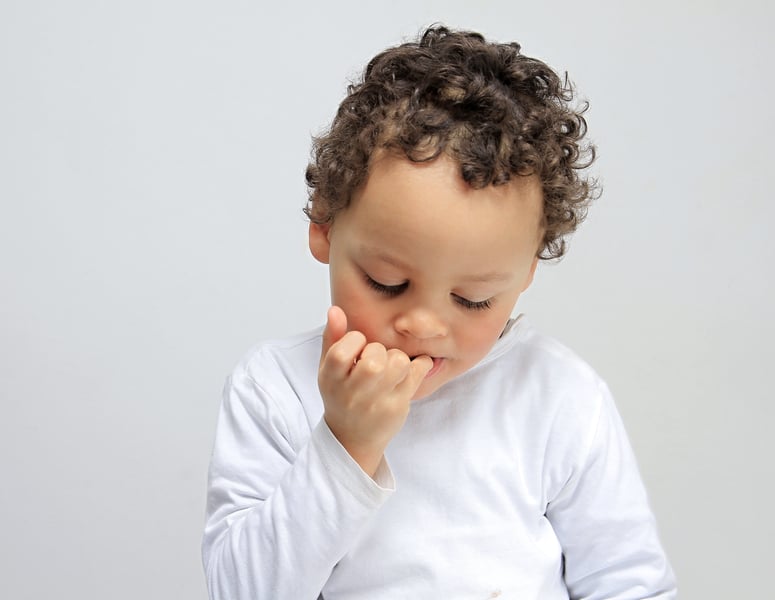Get Healthy!

- Miriam Jones Bradley, RN
- Posted April 11, 2023
How to Help Your Toddler Stop Biting Their Nails
Your toddler may be going through a phase of nail-biting that might be driving you crazy.
While biting or picking at one's nails is a common behavior in children (50% do it) and many will stop biting their nails on their own, some do not.
There are several reasons you may see your toddler picking his nails, according to Nationwide Children's. These include anxiety, copying someone else, nails that are too long, or boredom. Some may even bite their nails to provide extra stimulation for their brains.
For many children, nail-biting does not cause problems. However, Dr. Cindy Gellner, a pediatrician from the University of Utah, said in a recent podcast, "In some cases, nail-biting may cause a bacterial infection called paronychia [skin infections around the nails], which requires a doctor's visit for antibiotics... Children touch everything and then, if they put their fingers in their mouth, they can get sick because they have just introduced germs into their body. And some children who bite their nails for years can cause permanent nail damage."
Here are some tips on how to stop nail-biting in its tracks:
Less is more
At this young age, your best bet might be to do nothing. Nail-biting will often go away on its own, and the less fuss that is made, the more likely a toddler will be to forget all about it. Toddlers can be prone to contrariness, and making an issue of it may cause them to embrace the action rather than stop.
Trim those nails
The first thing Nationwide Children's suggests is to keep the nails trimmed and snag-free. If there isn't enough nail left to bite, it won't be as tempting.
Distraction for the win
Pay attention to the places and situations where the toddler bites or picks his or her nails, and you may be able to nip it in the bud. Keep your toddler's hands busy by distracting your child with another activity or object, according to Nationwide Children's.
- Ask them to pick something up or hold something for you
- Teach a more tolerable behavior (fidgeting with a pen)
- Have them do something with their hands that they cannot do while biting nails
- Have them do something annoying before they are allowed to bite their nails. They might just get annoyed enough to stop
A little positive reinforcement
With older toddlers a reward system like stickers can work. Set a reachable goal, such as five stickers, and add a reward, like a trip to the park. Then set a timer, and give a sticker if you don't see any nail-biting during that time period. With some children, simple praise for remembering not to bite their nails can work.
Lower stress
If you notice that nail-biting occurs during moments of strong emotion or stress, your toddler may be self-soothing, Tufts Medical Center says. Look for ways to change the atmosphere. For instance, if a child bites her nails while watching a particular type of video, it may be best to find another one or choose another activity, such as coloring. Music can also be a positive way to help children and parents relax. Babies love lullabies and maternal singing is particularly soothing for them, the American Academy of Pediatrics says.
Make nail biting unpleasant
Another suggestion for how to stop toddlers from biting their nails is to use a nail polish with a bitter flavor. The terrible taste will make them think twice before chewing. However, check with your doctor for a type that is safe for toddlers, as some have acetone or cayenne pepper and can be painful if your child rubs his eyes. As an alternative, olive oil has been shown in recent research to decrease biting behavior by making the nail feel softer without causing distress to the child.
In all likelihood, these suggestions for putting an end to nail-biting will be enough to banish the habit. However, if your toddler continues biting or picking his or her nails and you notice infections or raw, bleeding nail beds, you should consult your pediatrician.

